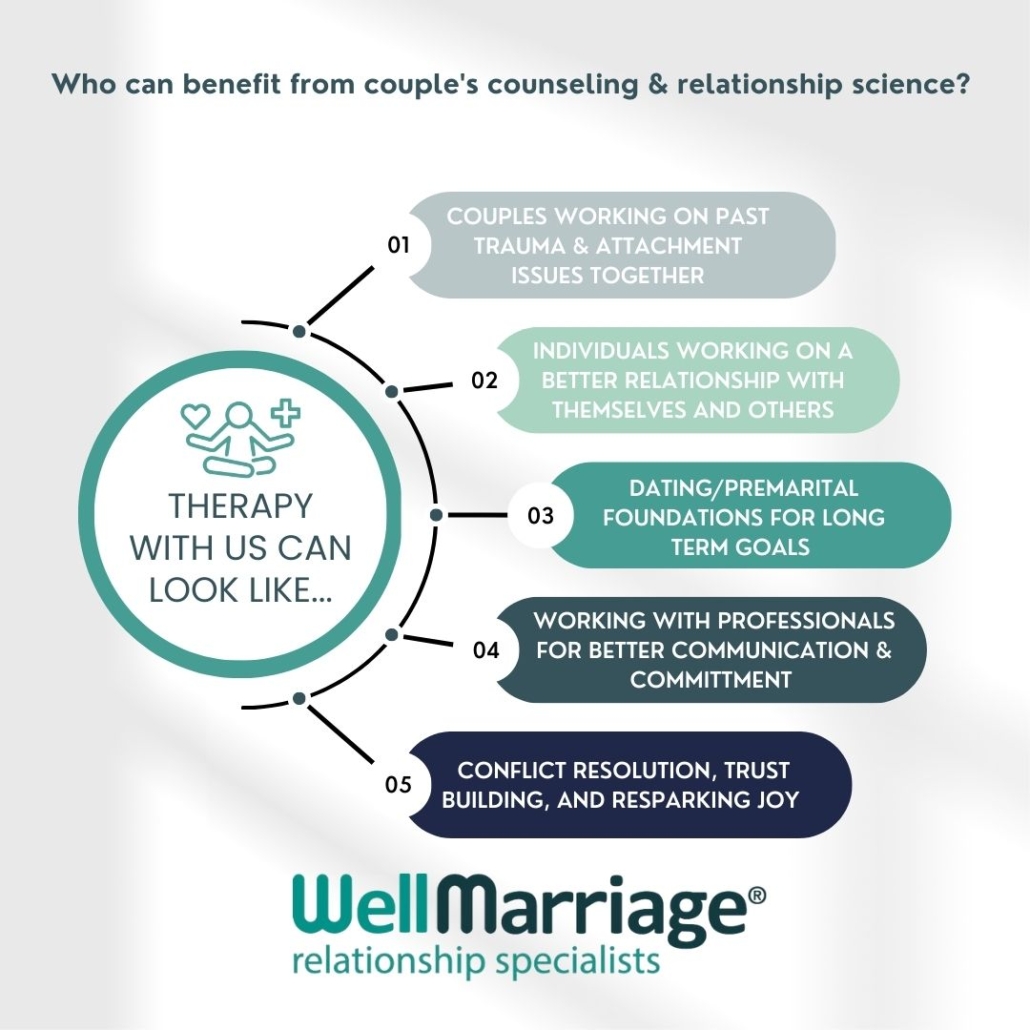What Not To Say During Couples Counseling
Before you decide to go to marriage counseling, it can seem a bit overwhelming. What are the right things to say? Is there anything you shouldn’t say? Of course, these fears can get in the way of open and honest communication between you and your partner. But couples counseling is about working together, and some things shouldn’t be said—like accusatory statements or hurtful comments.
So, when it comes to marriage counseling and what not to say, it’s important to remember that it is a team effort and everyone’s feelings should be considered and respected.
Most often, couples don’t feel worse after marriage counseling. In fact, it can be incredibly successful—75% of couples, on average, are able to rekindle their relationship through couples therapy. In this blog, we’ll talk about one of the common marriage counseling issues: communication.
3 Things You Should Never Say to Your Partner
In marriage counseling, tensions can get high when confronting complex issues head on, even with a plan and a great therapist. It’s important to remember that even in the heat of the moment, you should never attack or accuse your significant other. Remember the saying that you can’t take back what you say? That stands true, especially in vulnerable situations like couples therapy. While voicing your concern is important, there are productive ways to speak with your partner, even in tense situations. Here are a few things you should never say to your partner.
1. Attacks
In the heat of the moment, it might be tempting to say something you know will hurt your significant other’s feelings. Whether that’s something like “You’re so selfish!” or “I wish I never met you!” it’s important to approach those feelings in a constructive way. Attacks only produce resentment, hostility, and more distance. In a counseling session, the counselor should guide you through a productive discussion that avoids attacks and instead leads you to voice your frustrations in effective ways.
2. Accusations
Accusing your significant other of things like intentionally hurting you or even “If you really loved me, you’d do x for me!” can place a huge burden on a relationship. If you have concerns about the way your partner approaches certain issues, you can make that known through techniques like the “I feel” statement. Try, “I feel…frustrated and overwhelmed when you don’t help me clean the house,” instead of, “You need to help me clean the house!” Of course, a marriage counselor can help you navigate those feelings and communicate them clearly and in a non-accusatory way.
3. Blame
It might be tempting to make your partner feel guilty by bringing up something hurtful they’ve done in the past. But blaming them for how you feel isn’t fair. Significant others can hurt your feelings, but it’s often not an intentional outcome. Imagine you were out with friends and forgot to text that you were safe, and your partner’s response was telling you, “You must not love me because you don’t respect me and my feelings.” That’s a pretty harsh response to an honest mistake. Marriage counseling can help you avoid these reactions and fill your communication toolbox with healthy responses and approaches.
This list is by no means comprehensive, but avoiding these main three things is essential to building trust and healthy communication styles. You should aim to discuss things with your partner in a way that leads to healing inside and outside of the counseling session. Well Marriage Center offers you several resources for the dos and don’ts of marriage counseling, so you can feel confident in your decision to work with a licensed therapist. We want to help you renew your relationship and build communication skills in a safe and comfortable environment.
What Should I Not Tell a Marriage Counselor?
Being completely honest with your partner and therapist can be nerve-wracking. Vulnerability is tough to manage, but with a therapist, you should be able to explore your feelings more openly. Marriage counseling is a joint therapy plan that helps you navigate your relationship with someone else, which can be paired with individual sessions so you have the opportunity to share your feelings in both settings. You should always be honest with your counselor. They are there to help you, even if you sometimes disagree with their suggestions.
While couples counseling is built to be open and honest with your partner, a therapist might inform your partner of something you’ve said individually. Counselors are there to help you and your partner figure things out together, not take sides. You shouldn’t expect to tell a therapist a secret during a session that you want to be kept from your partner. However, the urge to keep secrets might be a good thing to discuss with your therapist. They can help you plan a healthier way of dealing with or communicating secrets and feelings.
Strengths-Based Marriage Counseling
At Well Marriage Center, we believe in focusing on the strengths of your relationship. Marriage counseling is about finding renewal and success in your partnership, not tearing each other down. Our experience helping over 15,000 couples can lead you through communication, trauma, sex, forgiveness, and other issues affecting your marriage. If you want to begin your counseling journey today, fill out the intake form to connect with Melinda, our Intake Coordinator. We will tailor a plan specifically for your relationship to help you get the most out of your counseling.
